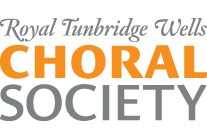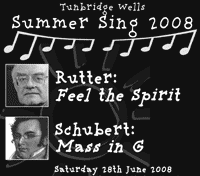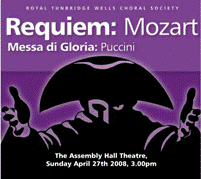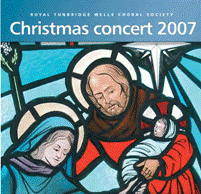Programmes and Reviews – 104th Season (2007-2008)
Mozart & Puccini
Mozart’s Requiem and Puccini’s Messa di Gloria
Assembly Hall – 27th April 2008
The Royal Tunbridge Wells Choral Society gave fine performances of two well-known and well-loved choral masterpieces last Sunday afternoon in the Tunbridge Wells Assembly Hall.
The concert began with the Messa di Gloria, written by a youthful Puccini. Although the text comprises the usual sections of the Mass, this is a work which definitely belongs in the concert hall; it is rather too exuberant and operatic in style to be ever considered appropriate in a liturgical setting.
There are some really good tunes in the two extended sections, particularly in the Gloria where the rollicking opening theme recurs several times including the end. The 100-strong RTW Choral Society clearly enjoyed this music and did well to keep up with the driving tempi set by their director Richard Jenkinson. They really were on top form, projecting their voices well across the orchestral forces, only occasionally being drowned out by equally exuberant brass players!
There were plenty of lyrical moments too, not only from the choral society but also by the soloists. We heard the tenor, Michael Bracegirdle, first in the Gloria and it was clear from his first notes that here was a tenor par excellence; his projection, intonation and diction were faultless” I never fail to be impressed by Richard Jenkinson’s skillful direction “. In the Credo that followed, the baritone soloist, Paul Carey Jones, showed that he also has a really fine voice. Some brief sections are written quite low in the register and that makes it difficult to be heard over even the quietest strings and woodwind. A moment of sheer magic was their brief duet in the closing Agnus Dei.
I never fail to be impressed by Richard Jenkinson’s skillful direction. He brings out all the nuances of the score by paying meticulous attention to detail particularly the dynamics and by his wide choice of tempi. Sometimes the slow sections seem almost dangerously slow, but every note is exactly in place and he does not feel limited by the singers need to breathe. The orchestra relished the fast tempi which were truly exciting (verging on terrifying) and, for the most part, the singers were well able to keep up. Only later in the concert was I aware that the basses fell a little behind in two places but that could have been due to near exhaustion! But Richard always retains complete control.
In the second half of the programme we heard a moving account of Mozart’s Requiem. The young Mozart died before completing this last commission and it was left to his friend Franz Sussmayer to weave Mozart’s sketches and add his own material to produce the completed work we know today.
This is writing on a big scale and has some dramatic movements for the choir including the Dies Irae and the Rex Tremendae. Their singing sounded fresh and exciting with the sopranos and tenors really coming through the texture. They had clearly maintained their stamina despite their big sing in the Puccini earlier and doubtless a long rehearsal in the morning. In the Confutatis Maledictis the stark contrast between the men’s agitation and the ladies’ angelic interludes was controlled really well and in the contemplative movements, particularly the lovely Lacrimosa, all eyes of the choir were on Richard Jenkinson as he shaped each phrase to perfection.
The tenor and baritone soloists were joined by soprano Rebecca Ryan* and mezzo soprano Catherine King for the Requiem. As a group they have their own movements in the Tuba Mirum and Recordare and their blend and control was admirable.
Lastly I pay tribute to the superb playing of the orchestra which was always sensitive so that they supported the singers rather than competed with them as can so often happen.
It was good to see a near-capacity audience for this concert with quite a few youngsters enjoying the music-making. With concerts of this quality it is not hard to see why so many wanted to come and listen.
© Paul Jeffery
* Note that Rebecca Ryan replaced Rachel Nicholls who was indisposed (see last page of programme)
Elgar – The Kingdom – repeat performance in Wiesbaden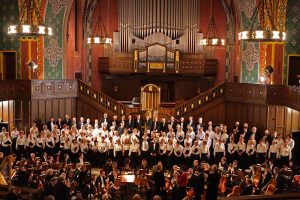
English Translation of Review
Elgar’s oratorio “The Kingdom”
Lutherkirche, Weisbaden – 24th November 2007
with the Bach Choir (of Wiesbaden) and RTWCS
directed by Klaus Uwe Ludwig
Musical Building Blocks for a Heavenly Kingdom
From the opening notes in the Lutherkirche, orchestral sounds entrance the audience. A whole tonal landscape thunderously unfolds and the heavenly Jerusalem arises in front of the listening audience.
At the name of Edward Elgar, this best known of British composers, who does not think of the Pomp and Circumstance march, of powerful brass and waves of sound? Certainly this will be so for the many music lovers who have now had the opportunity of experiencing with the Wiesbaden Bach Choir and Bach Orchestra an Elgar oratorio. Following on from The Dream of Gerontius in 1994, Klaus Uwe Ludwig took on The Kingdom for the 150th anniversary of the composer’s birth. The kingdom of Jesus Christ is created, and Elgar leads us subtly through the scenes which are largely taken from the Acts of the Apostles. Jesus’ promise “in the upper room”, the installation of Matthew as an apostle, but also the story of Whitsun are the “building blocks” of this kingdom. The dramatic tension is particularly powerful here – in mainly hushed tones the soloists and choir play their several parts in telling the story.
The transformation of this narrative finesse into musical reality in this concert was beautifully achieved by Klaus Uwe Ludwig, who once again gave expression to town twinning in its finest form: in the 27th year of their co-operation,the Royal Tunbridge Wells Choral Society appearing together with the Bach Choir and the Bach Orchestra
From the start, the tonal clarity of over one hundred male and female singers captured the audience’s imagination, the choral sound seeming to come from within, but never at the expense of a quite tangible presence. And all the while Ludwig held his “giant sound machine” together in a concentrated tension, a tension in which the mighty Walcker organ also played its part.
Elgar saves the exploitation of powerful resources for a dramatic climax in the Whitsun story where a “thundering from the sky” fills the Lutherkirche. The softer passages remain just as strongly in the memory, however, as in the scene of the Last Supper where Werner Maxim (bass) in piano singing gives an expression of holiness with not a trace of pathos. The balanced line-up of soloists was particularly convincing: alongside the soprano Katrin Wagner were Annerose Hummel (with a naturally warm mezzo-soprano voice), Henner Leye (tenor) and Werner Maxim. Woven into the fabric of the performance the soloists gave a well modulated interpretation which was never lacking in interest.
Translation provided by Tunbridge Wells Twinning Association
A photograph of the choirs taking a bow after the Concert can be viewed on the Photo Gallery
Original version written in German
Elgars Oratorium “The Kingdom”
Lutherkirche, Weisbaden – 24. November 2007 Bach-Chor und Royal Tunbridge Wells Choral Society
“Klingende Bausteine eines himmlischen Königreichs unter Leitung von Klaus Uwe Ludwig”
Wiesbaden Orchesterklänge ziehen die Zuhörer in der Lutherkirche vom ersten Ton an in ihren Bann, brausend entfaltet sich ein ganze Klanglandschaft – vor den Ohren des Publikums entsteht das himmlische Jerusalem.
Edward Elgar: Wer denkt beim Namen dieses wohl bekanntesten britischen Komponisten nicht an “Pomp and Circumstances”, an gewichtige Bläsersätze und Klangwogen? Bestimmt auch viele Musikfreunde, die nun Gelegenheit hatten, ein Oratorium Elgars mit dem Bach-Chor und dem Bach-Orchester Wiesbaden zu erleben. Nach “The Dream of Gerontius” im Jahre 1994 nahm sich Klaus Uwe Ludwig zum 150. Geburtstag des Komponisten nun “The Kingdom” vor. Das Königreich Jesu Christi wird errichtet, und Elgar führt uns subtil durch die Szenen, die weitgehend der Apostelgeschichte entnommen sind. Verheißungen Jesu “In the upper room”, die Einsetzung des Matthias als Apostel, aber auch die Pfingstgeschichte sind “Bausteine” dieses Königreichs. Dabei ist vor allem der dramatische Spannungsbogen wichtig – mit meist verhaltenen Tönen erzählen Soli und Chor das Geschehen in verteilten Rollen.
Dies erzählerische Feingefühl in klingende Realität zu verwandeln ist an diesem Abend das Verdienst von Klaus Uwe Ludwig, der hier auch einmal mehr Städtepartnerschaft in ihrer wohl schönsten Form betreibt: mit Bach-Chor und Bach-Orchester zusammen war es die “Royal Tunbridge Wells Choral Society”, die gemeinsam mit den Wiesbadenern nun schon im 27. Jahr konzertiert.
Von Beginn an faszinierte die Transparenz im Klang der über 100 Frauen- und Männerstimmen – es scheint immer wieder, als ob der Chorklang von innen leuchte, was jedoch nie auf Kosten einer ganz greifbaren Präsenz geht. In konzentrierter Spannung hält Ludwig dabei seinen “Riesen-Klangapparat” zusammen, in den hier sogar die mächtige Walcker-Orgel einbezogen ist.
Das Ausschöpfen gewaltiger Möglichkeiten spart sich Elgar für einen dramatischen Höhepunkt wie die Pfingsterzählung auf, wo “ein Brausen vom Himmel” die Lutherkirche erfüllt. Ebenso stark aber bleiben die leisen Momente im Gedächtnis, wenn etwa vom Abendmahl die Rede ist und Werner Maxin (Bass) in verhaltenem Ton Heiligkeit zum Ausdruck bringt, die kein bisschen Pathos in sich trägt. Überhaupt überzeugte die ausgewogene Solisten-Besetzung: Neben der Sopranistin Katrin Wagner nämlich Annerose Hummel (mit natürlich-warmem Mezzo-Sopran), Henner Leye (Tenor) und Werner Maxin. Ins Geschehen mit eingewoben, setzten die Solisten immer wieder Akzente in der zweistündigen Erzählung, die doch von Längen nichts spüren ließ.
©Astrid Scheldt – Wiesbadener Kurier
English Translation of Preview (Pre-concert)
The Wiesbaden Bach Choir, the Bach Orchestra and the Royal Tunbridge Wells Choral Society present Elgar’s “The Kingdom” under the direction of Klaus Uwe Ludwig.
Big Line-up for Oratorio with Rich Orchestration
The date of the first joint performance of the Wiesbaden Bach Choir and the Royal Tunbridge Wells Choral Society is something Klaus Uwe Ludwig remembers precisely: it was in May 1985. Since then they have worked together many times, and some fifty singers from England will also be taking part when Edward Elgar’s oratorio The Kingdom, composed in the first years of the 20th century, is performed under Ludwig’s baton in the Lutherkirche this coming Saturday. At Whitsun members of the Bach Choir took part in a performance of the oratorio in England.
The Kingdom is an oratorio largely unknown in Germany. ‘In Elgar’s home country the situation is very different.,’ says Ludwig. ‘Having already presented numerous rarely performed works in the Lutherkirche,’ says the church’s musical director with some pride, ‘we hit on the idea of performing this work. The oratorio,’ he explains, ‘has nothing to do with the British royal family, and the title refers to Christ’s kingdom on earth. The text, written by Elgar himself and drawn from the Old and New Testaments, with the main emphasis on sections from the Acts of the Apostles, will be sung by the choir and four soloists. Hence the oratorio is exceptionally dramatic. It has the internal dynamic of a fully fledged opera,’ adds Ludwig. The four soloists Katrin Wagner (soprano), Annerose Hummel (contralto), Henner Leye (tenor) and Werner Maxim (bass) will take the parts of Mary, Mary Magdalen, Peter and John.
The Bach Orchestra will be at full strength, as Elgar’s orchestration is both rich and, according to Ludwig, extremely refined. There will also be ‘scenes of great intensity’. The conductor finds the end of the oratorio, which gently fades away after just under two hours, ‘unbelievably beautiful. The Kingdom places great demands both on the English and the German participants,’says Ludwig, drawing attention to the numerous changes of tempo, which often follow on in rapid succession, adding life and vigour to the whole production.
©Axel Zibulski writing in the Wiesbaden Kurier 23rd November 2007.
Translation provided by Tunbridge Wells Twinning Association
A celebration of the 100th birthday of Roy Douglas
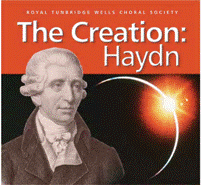
Haydn’s Creation
Assembly Hall – 18th November 2007
It is unlikely in the history of concert going that an audience has spanned such a wide age range as was the case on Sunday at the Assembly Hall. The Royal Tunbridge Wells Choral Society was honouring its president by performing the work of his choice, Haydn’s Creation. Roy Douglas, well-loved local musician, famous for his work as amanuensis to at least two of the greatest British composers of the twentieth century (Vaughan Williams and Walton), not only attended the concert, which took place just two weeks before his hundredth birthday, but also graciously received a presentation from former conductor Derek Watmough and current conductor Richard Jenkinson, and then addressed the audience. It was at this moment that the baby called out! A special display in the foyer and a comprehensive article in the programme testified to Roy Douglas’s long and distinguished career. In a short interview during the interval he recalled for me some of his musical memories and his long association with Tunbridge Wells. We send him our thanks, congratulations and best wishes.
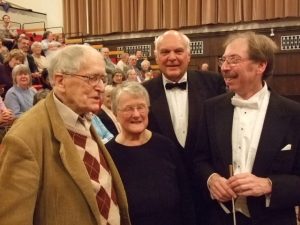
L to R: Roy Douglas, Helen MacNab, Derek Watmough MBE and conductor Richard Jenkinson
Like Roy Douglas, Haydn often showed a great sense of humour and an enjoyment of life which he expressed in his music. The Creation was written in 1798 in Haydn’s later years, yet it is full of youthful freshness, originality and delight at the ‘wonders of His work’. The choir, orchestra (as always, capably led by Jane Gomm) and soloists responded to their conductor, Richard Jenkinson, to convey this in full to the enthusiastic audience. The splendid choruses, which reflect Haydn’s admiration for Handel’s music, were tackled confidently by the choir with excellent diction and articulation. There was a wonderful array of fine orchestral playing, including some superbly flexible and expressive wind playing. Haydn frequently provided programmatic accompaniments to colour the text as it described the panoply of animal and vegetable life, and these passages allowed us to appreciate our gifted musicians.
The soloists were, as always, excellent musicians who bring a wealth of talent and experience to our local scene. This line-up was no exception – Nicki Kennedy (soprano), Sean Clayton (tenor) and Adrian Powter (baritone), ably joined by Harriet Webb (mezzo-soprano) for the final quartet- and they sang with the childlike wonder at creation and with the nobility required for the work of the Creator. A beautiful sense of human warmth was added for the depiction of Adam and Eve, the singers looking at each other in their duets. Nicki Kennedy was outstanding in her vocal agility and her communication with the audience, whilst Sean Clayton and Adrian Powter sang with dignity and flexibility. Mention must be made here of the beautifully-intimate continuo playing of Christopher Harris (harpsichord) and William Bass (cello) during the Adam and Eve scene.
Haydn’s Creation is strangely incongruous for people of the early twenty-first century with their cynicism about religion and their coldly-scientific approach to nature. Yet like the extremes of age in our audience, we would learn much by marrying the wisdom and skill of age with the naive sense of wonder of the little child, just as ‘Papa’ Haydn did in this wonderfully timeless work.
© Roger Evernden
Note: Roy Douglas remained president of RTWCS until his death in March 2015. A memorial concert was held April 2016.
